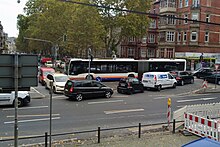From Wiktionary, the free dictionary
Gridlock at an intersection. From grid lock
( UK ) IPA (key ) : /ˈɡɹɪdˌlɒk/ , /ˈɡɹɪdˌlɒk/ ( US ) IPA (key ) : /ˈɡɹɪdˌlɑk/ Hyphenation: grid‧lock gridlock (countable and uncountable plural gridlocks
( road transport ) traffic congestion on the streets or highways of a crowded city, in which no one can move because everyone is in someone else's way.On a smaller scale, the situation in which cars enter a signal -controlled intersection too late during the green light cycle, and are unable to clear the intersection (due to congestion in the next block ) when the light turns red , thus blocking the cross traffic when it's their turn to go. Repeated at enough intersections, this phenomenon can lead to citywide gridlock.
( figuratively , by extension) paralysis of a complex system due to severe congestion , conflict , or deadlock .
2024 July 8, Adam Nossiter, Aurelien Breeden, “5 Takeaways From France’s Snap Election”, in The New York Times [1] →ISSN But no party appeared on track to secure an absolute majority, leaving one of Europe’s largest countries headed for gridlock or political instability.
traffic congestion
Arabic: جُمُود ( jumūd )
Armenian: կուտակականգ ( kutakakang ) , խռնվածք (hy) ( xṙnvackʻ )
Chinese:
Mandarin: 交通阻塞 (zh) ( jiāotōng zǔsè )
Czech: zablokování
Dutch: verkeersinfarct (nl) n verkeerschaos (nl) m
Finnish: liikennesuma
French: paralysie (fr) f embouteillage (fr) m
German: Verkehrsinfarkt m Verkehrskollaps m
Hebrew: רשת (he) ( réshet )
Hindi: ग्रिडलॉक ( griḍlŏk )
Hungarian: óriási dugó megbénult forgalom
Icelandic: sundrung f
Irish: tranglam tráchta m
Italian: ingorgo (it) m
Japanese: 交通渋滞 (ja) ( こうつうじゅうたい, kōtsū jūtai ) , 渋滞 (ja) ( じゅうたい, jūtai )
Korean: 교착 상태 ( gyochak sangtae )
Norwegian:
Bokmål: trafikkork (no) m kork (no) m
Persian: راهبندان ( râh-bandân )
Portuguese: engarrafamento (pt) m
Russian: зато́р (ru) m ( zatór )
Spanish: embotellamiento (es) m atasco (es) m
Swedish: totalstopp (sv) n
Ukrainian: затор (uk) ( zator )
Vietnamese: khóa lưới
on a smaller scale
Arabic: please add this translation if you can
Armenian: խցանում (hy) ( xcʻanum )
Chinese:
Mandarin: 塞車 / 塞车 (zh) ( sāichē )
Czech: please add this translation if you can
Dutch: opstopping (nl) f verkeersopstopping (nl) f
Finnish: tukos (fi)
French: embouteillage (fr) m
German: Stau (de) m
Hindi: please add this translation if you can
Hungarian: forgalmi dugó (hu) , (közlekedési ) dugó , torlódás (hu) , ( minor ) fennakadás (hu) , elakadás (hu)
Italian: please add this translation if you can
Japanese: 渋滞 (ja) ( じゅうたい, jūtai ) , 雑踏 (ja) ( ざっとう, zattō ) , 雑沓 (ja) ( ざっとう, zattō )
Korean: please add this translation if you can
Norwegian:
Bokmål: kø (no) m kork (no) m
Portuguese: engarrafamento (pt) m
Russian: про́бка (ru) f ( próbka ) , зато́р (ru) m ( zatór )
Spanish: atasco (es) m
Vietnamese: please add this translation if you can
deadlock
Arabic: please add this translation if you can
Armenian: փակուղի (hy) ( pʻakuġi ) , մեռյալ կետ (hy) ( meṙyal ket )
Chinese:
Mandarin: 僵局 (zh) ( jiāngjú )
Czech: please add this translation if you can
Dutch: impasse (nl) m patstelling (nl) f
Finnish: suma (fi) , umpikuja (fi)
French: impasse (fr) m interblocage (fr)
Georgian: გამოუვალი სიტუაცია ( gamouvali siṭuacia ) , გამოუვალი მდგომარეობა ( gamouvali mdgomareoba ) , ჩიხი (ka) ( čixi )
German: Stillstand (de) m
Hindi: please add this translation if you can
Hungarian: holtpont (hu) , patthelyzet (hu)
Irish: sáinn f
Italian: please add this translation if you can
Japanese: 停滞 (ja) ( ていたい, teitai )
Korean: please add this translation if you can
Portuguese: impasse (pt) m
Russian: тупи́к (ru) m ( tupík ) , засто́й (ru) m ( zastój ) , мёртвая то́чка f ( mjórtvaja tóčka )
Spanish: paralización
Vietnamese: please add this translation if you can
gridlock (third-person singular simple present gridlocks present participle gridlocking simple past and past participle gridlocked
To cause traffic congestion . 

